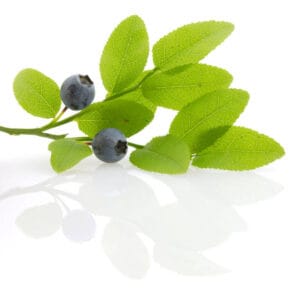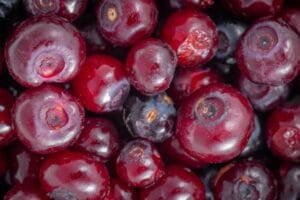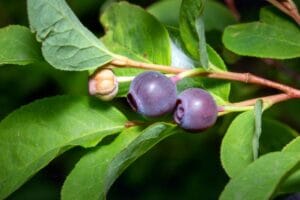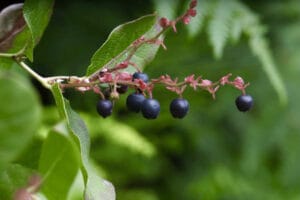Huckleberry, a small and vibrant berry native to North America, is not only a delightful addition to various culinary dishes but also offers numerous health benefits. The huckleberry, often compared to blueberries in taste and appearance, is rich in essential nutrients, antioxidants, and fiber, making huckleberry a valuable component of a healthy diet. Below, we explore the key health benefits of consuming huckleberry and how it can enhance overall wellness. Huckleberry is truly a superfood worth incorporating into your meals!
 Rich in Antioxidants
Rich in Antioxidants
Huckleberries are packed with antioxidants, particularly anthocyanins, which give the berries their dark purple or red color. These compounds play a vital role in neutralizing free radicals in the body, helping to prevent oxidative stress and reduce the risk of chronic diseases like cancer, heart disease, and neurodegenerative disorders. Regular consumption of antioxidant-rich foods like huckleberries can contribute to overall cellular health and longevity.
In addition to anthocyanins, huckleberries contain a unique array of other antioxidants, including flavonoids and phenolic acids, which enhance their health-promoting properties. These compounds work synergistically, offering protection against oxidative stress while also supporting the immune system and promoting anti-inflammatory responses.
What sets huckleberries apart from other berries is their elevated concentration of certain antioxidants, which are believed to contribute to better cognitive function and cardiovascular health. Regularly incorporating huckleberries into the diet can offer a distinctive and potent source of antioxidants that may not be as prevalent in other fruits.
 Supports Heart Health
Supports Heart Health
The anthocyanins found in huckleberries not only act as antioxidants but also help improve cardiovascular health. Studies have shown that these compounds can reduce inflammation, lower blood pressure, and improve cholesterol levels, all of which are crucial for maintaining a healthy heart. The fiber content in huckleberries further aids in reducing bad cholesterol (LDL), promoting better blood circulation and heart function.
The unique phytochemical profile of huckleberries sets them apart from other berries. In addition to anthocyanins, they are rich in flavonoids and phenolic compounds, which enhance their antioxidant capabilities. These substances work synergistically to combat oxidative stress and inflammation in the cardiovascular system, promoting overall heart health.
Furthermore, the high fiber content in huckleberries not only helps lower LDL cholesterol but also supports healthy blood pressure levels. The soluble fiber can bind to cholesterol in the digestive system, facilitating its excretion. This dual action on cholesterol levels and blood pressure makes huckleberries a potent ally for cardiovascular wellness. Their low glycemic index also contributes to stable blood sugar levels, reducing the risk of heart-related issues linked to diabetes.
 Boosts Immune System
Boosts Immune System
Huckleberries are an excellent source of vitamin C, a key nutrient that plays a significant role in boosting the immune system. Vitamin C stimulates the production of white blood cells, which are essential for fighting infections and illnesses. It also acts as an antioxidant, protecting immune cells from damage and ensuring a strong immune response.
In addition to vitamin C, huckleberries are rich in various phytochemicals, including anthocyanins. These compounds have been shown to enhance immune function by reducing inflammation and oxidative stress, both of which can weaken the immune system. The unique blend of antioxidants in huckleberries differentiates them from other fruits, allowing for a more robust defense against pathogens.
Furthermore, huckleberries also contain minerals such as zinc and iron, which are crucial for maintaining optimal immune health. Zinc plays a vital role in the development and function of immune cells, while iron is essential for the transportation of oxygen in the blood. The synergistic effect of these nutrients in huckleberries makes them a powerful ally in promoting a healthy immune response, setting them apart from other berry options.
 Promotes Digestive Health
Promotes Digestive Health
High in dietary fiber, huckleberries support digestive health by promoting regular bowel movements and preventing constipation. Fiber is essential for maintaining a healthy gut, as it encourages the growth of beneficial bacteria and aids in the absorption of nutrients. A diet rich in fiber from fruits like huckleberries can also reduce the risk of digestive disorders, such as irritable bowel syndrome (IBS) and colon cancer.
Huckleberries are unique among fruits not only for their flavor but also for their rich content of polyphenols, which contribute to gut health by acting as prebiotics. These compounds nourish beneficial gut bacteria, enhancing their growth and activity. Unlike many other berries, huckleberries have a higher concentration of certain antioxidants, such as anthocyanins, which can reduce inflammation in the gut and promote overall digestive health.
Additionally, the natural sugars in huckleberries are balanced by their fiber content, leading to a gradual release of glucose into the bloodstream. This helps prevent spikes in blood sugar levels, which can affect digestive health. Their distinctive combination of nutrients makes huckleberries a powerful ally in maintaining a healthy digestive system, setting them apart from other fiber-rich fruits.
 Improves Vision
Improves Vision
Huckleberries have been linked to improved eye health, thanks to their high levels of anthocyanins and other antioxidants. These compounds help protect the eyes from oxidative damage, which can lead to conditions such as cataracts and age-related macular degeneration (AMD). Additionally, the vitamin C content in huckleberries helps maintain the health of blood vessels in the eyes, further supporting clear vision.
Furthermore, huckleberries are unique in their high concentrations of specific antioxidants, particularly anthocyanins, which are not only responsible for their deep purple color but also contribute significantly to eye health. These compounds enhance night vision and improve overall visual acuity by improving the blood flow to the eyes and strengthening retinal function.
Additionally, huckleberries contain essential nutrients like lutein and zeaxanthin, which are known for their protective role against blue light exposure, a growing concern in our digital age. Unlike many other berries, huckleberries offer a distinctive combination of flavor and health benefits, making them a standout choice for enhancing vision and supporting ocular health.
 Anti-Inflammatory Properties
Anti-Inflammatory Properties
The anti-inflammatory effects of huckleberries are another significant benefit. Chronic inflammation is linked to a wide range of health problems, including arthritis, diabetes, and heart disease. The antioxidants and polyphenols in huckleberries help reduce inflammation in the body, alleviating symptoms of inflammatory conditions and contributing to overall well-being.
The unique anti-inflammatory properties of huckleberries can be attributed to their high concentration of specific antioxidants, particularly anthocyanins. These compounds not only provide the berries with their rich color but also play a crucial role in modulating inflammatory pathways in the body. Research indicates that anthocyanins can inhibit the production of pro-inflammatory cytokines, offering a protective effect against various inflammatory diseases.
Additionally, huckleberries are rich in polyphenols, which have been shown to combat oxidative stress more effectively than many other fruits. This synergistic effect enhances their ability to reduce inflammation, setting huckleberries apart from more common anti-inflammatory foods like blueberries and cherries. Incorporating huckleberries into the diet can therefore provide a unique and powerful natural approach to managing inflammation and promoting overall health.
Aids in Weight Management
Due to their low calorie and high fiber content, huckleberries are an excellent addition to a weight-conscious diet. The fiber helps you feel fuller for longer, reducing the temptation to overeat. In addition, the natural sugars in huckleberries are balanced by their fiber, leading to a slower release of glucose into the bloodstream, which helps prevent spikes in blood sugar levels.
In addition to their low calorie and high fiber content, huckleberries are unique due to their rich antioxidant profile, particularly anthocyanins. These compounds not only provide their vibrant color but also help regulate fat metabolism, which can be beneficial for weight management. Unlike other fruits, huckleberries have a lower glycemic index, promoting stable energy levels and minimizing cravings for unhealthy snacks.
Moreover, the polyphenols found in huckleberries may aid in reducing inflammation, a key factor in obesity and metabolic disorders. By incorporating huckleberries into a balanced diet, individuals can harness these distinctive properties to support their weight management goals while enjoying a delicious, nutrient-dense fruit.
Supports Brain Health
The antioxidants in huckleberries are not only beneficial for the heart and immune system but also for brain health. Research suggests that regular consumption of antioxidant-rich berries can help improve cognitive function and reduce the risk of age-related cognitive decline. The anti-inflammatory properties of huckleberries may also protect the brain from damage caused by inflammation and oxidative stress.
In addition to their antioxidant properties, huckleberries are rich in flavonoids. These compounds have been shown to enhance neural communication and improve memory by promoting blood flow to the brain. This increased circulation can help nourish brain cells, leading to better cognitive function.
Moreover, the anti-inflammatory effects of huckleberries are significant in protecting against neurodegenerative diseases such as Alzheimer’s. By reducing inflammation in the brain, huckleberries may help maintain neuronal integrity and prevent cognitive decline associated with aging.
Helps Regulate Blood Sugar Levels
Huckleberries may be beneficial for individuals with diabetes or those at risk of developing the condition. The fiber in huckleberries slows the absorption of sugars into the bloodstream, helping to maintain stable blood sugar levels. Additionally, some studies suggest that the polyphenols and anthocyanins present in huckleberries can improve insulin sensitivity, reducing the risk of insulin resistance—a key factor in type 2 diabetes.
Moreover, huckleberries possess a low glycemic index, which means they release sugar slowly into the bloodstream. This property helps prevent spikes in blood sugar, making them a smart choice for those managing diabetes or looking to maintain steady energy levels throughout the day.
Improves Skin Health
Thanks to their high content of antioxidants, particularly vitamins C and E, huckleberries can promote healthier skin. Vitamin C plays a vital role in collagen production, which helps maintain skin elasticity and reduce the appearance of wrinkles. The antioxidants in huckleberries also protect the skin from damage caused by environmental factors like UV radiation and pollution, which can accelerate aging. Regular consumption of huckleberries may contribute to a more youthful, radiant complexion.
In addition to their antioxidant properties, huckleberries are rich in anthocyanins, are known for their anti-inflammatory benefits. These compounds can help soothe skin irritation and redness, promoting an even skin tone.
Moreover, the high fiber content of huckleberries supports gut health, which is intrinsically linked to skin condition. A healthy gut can reduce inflammation and improve overall skin clarity, distinguishing huckleberries from other berries. Their unique blend of vitamins, antioxidants, and anti-inflammatory properties makes them a standout choice for those seeking radiant skin.
Supports Bone Health
Huckleberries contain important minerals like calcium and magnesium, both of which are essential for maintaining strong bones. Calcium helps build and maintain bone density, while magnesium aids in the absorption of calcium and supports overall bone structure. The vitamin C in huckleberries also helps in collagen formation, which is important for bone and cartilage health. Including huckleberries in your diet may help lower the risk of osteoporosis and other bone-related conditions.
Besides calcium and magnesium, they are rich in vitamin K, which plays a crucial role in bone metabolism and helps prevent fractures. Moreover, huckleberries are low in calories and rich in fiber, which aids digestion and contributes to overall nutrient absorption, ensuring that your body effectively utilizes the minerals necessary for maintaining strong bones.
The high antioxidant content, particularly anthocyanins, also helps reduce inflammation, further supporting bone health by minimizing the risk of bone-related diseases like arthritis. This antioxidant profile not only promotes better bone integrity but also enhances overall skeletal strength, making huckleberries a valuable addition to a bone-healthy diet.
Reduces the Risk of Certain Cancers
The potent antioxidants in huckleberries, particularly anthocyanins and flavonoids, have been shown to possess anti-cancer properties. These compounds help prevent the formation of cancer cells by neutralizing free radicals and reducing oxidative damage to DNA. While more research is needed, preliminary studies suggest that consuming antioxidant-rich foods like huckleberries may help lower the risk of certain cancers, including colon, breast, and prostate cancers.
Huckleberries have one of the highest antioxidant capacities among berries, which is particularly beneficial for combating oxidative stress associated with cancer development. Moreover, the fiber content in huckleberries plays a critical role in digestive health, aiding in the elimination of toxins and potentially reducing cancer risk.
Enhances Energy Levels
Huckleberries are a good source of natural carbohydrates, which provide energy for the body. The slow release of sugars due to their fiber content ensures sustained energy throughout the day, preventing the sudden spikes and crashes associated with high-sugar foods. Additionally, the antioxidants and nutrients in huckleberries support cellular energy production, helping to improve endurance and reduce fatigue.
Huckleberries are not only a source of natural carbohydrates but also contain essential vitamins and minerals that contribute to sustained energy levels. Their high vitamin C content aids in iron absorption, which is crucial for oxygen transport in the blood. This can enhance physical performance and reduce fatigue during exercise.
Boosts Mental Clarity and Mood
In addition to protecting against age-related cognitive decline, huckleberries may enhance mood and mental clarity. Some studies have linked the consumption of antioxidant-rich berries to improved mood and reduced symptoms of depression and anxiety. The antioxidants help reduce inflammation and oxidative stress in the brain, leading to improved mental function and emotional well-being.
Additionally, the presence of vitamins C and E in huckleberries supports neurotransmitter function, which is crucial for regulating mood and emotional responses. Regular consumption can help combat oxidative stress, providing a natural boost to mental well-being and resilience against stressors.
Promotes Healthy Hair
The vitamins and antioxidants in huckleberries, especially vitamin C, can benefit hair health. Vitamin C plays a role in the production of collagen, which strengthens hair follicles and promotes hair growth. Additionally, the antioxidants protect hair cells from damage caused by environmental stressors, potentially preventing hair thinning and loss. Regular consumption of huckleberries can contribute to healthier, shinier hair.
In addition to vitamin C, huckleberries are rich in vitamin E and essential fatty acids, both of which are crucial for maintaining healthy hair. Vitamin E acts as a powerful antioxidant that helps reduce oxidative stress on hair follicles, promoting a healthy scalp environment. The presence of omega-3 and omega-6 fatty acids in huckleberries supports hair hydration and elasticity, distinguishing them from other fruits that may lack these beneficial components.
A Natural Detoxifier
Huckleberries also act as a natural detoxifier. Their high water content and antioxidants help the body eliminate toxins more efficiently. By supporting liver function and promoting the excretion of harmful substances, huckleberries can aid in cleansing the body. Detoxifying regularly through a healthy diet that includes foods like huckleberries can enhance energy, improve digestion, and support skin health.
Huckleberries are particularly rich in unique antioxidants that enhance their detoxifying properties. These compounds can help neutralize harmful free radicals, thus preventing cellular damage. Unlike many other berries, huckleberries contain a higher concentration of these potent antioxidants, making them exceptionally effective in promoting liver health and enhancing its detoxification processes.
Moreover, the fiber found in huckleberries aids in digestive health, facilitating the removal of waste and toxins from the body. This dual action—combining antioxidant properties with high fiber content—sets huckleberries apart from other fruits and plants, making them a powerful ally in any detoxification regimen.
Nutritional Value of Huckleberries (per 100 grams)
- Calories: 37 kcal
- Carbohydrates: 9.3 g
- Sugars: 5.1 g
- Dietary Fiber: 4.2 g
- Protein: 1.0 g
- Fat: 0.5 g
- Saturated Fat: 0.0 g
- Monounsaturated Fat: 0.1 g
- Polyunsaturated Fat: 0.2 g
- Cholesterol: 0 mg
Vitamins:
- Vitamin A: 48 IU (1% of the Daily Value)
- Vitamin C: 4.8 mg (8% of the Daily Value)
- Vitamin E: 0.6 mg (3% of the Daily Value)
- Vitamin K: 5.3 µg (6% of the Daily Value)
- Folate (Vitamin B9): 5 µg (1% of the Daily Value)
Minerals:
- Calcium: 6 mg (1% of the Daily Value)
- Iron: 0.3 mg (2% of the Daily Value)
- Magnesium: 7 mg (2% of the Daily Value)
- Potassium: 72 mg (2% of the Daily Value)
- Phosphorus: 12 mg (1% of the Daily Value)
- Sodium: 2 mg (0% of the Daily Value)
Other Nutrients:
- Water content: 86.5 g
- Antioxidants: High levels of anthocyanins, which give huckleberries their dark color and provide numerous health benefits.
Conclusion
Huckleberries are a nutrient-dense superfood that offers a wide range of health benefits. From improving heart health and boosting the immune system to promoting better digestion and supporting brain function, these berries are a delicious and natural way to enhance your overall well-being. Incorporating huckleberries into your diet, whether fresh, frozen, or in jams and smoothies, can contribute to a healthier lifestyle and help protect against chronic diseases.
 Recipe
Recipe
For a delicious summer dessert, this Huckleberry Crisp recipe brings together the tart sweetness of wild huckleberries with a buttery, oat-crisp topping. With a simple preparation and a bake time of just 30 minutes, it makes for the perfect treat to enjoy with a scoop of vanilla ice cream. The blend of brown sugar, cinnamon, and nutmeg enhances the natural flavor of the berries, making it a satisfying dessert for any occasion.
Contraindications for the consumption of huckleberries
1. Allergic Reactions:
Individuals allergic to berries may experience symptoms such as itching, hives, or swelling. Those with a known berry allergy should avoid huckleberries or consult a doctor first.
2. Diabetes and Blood Sugar Control:
Though low in sugar, huckleberries still contain natural sugars. People with diabetes should consume them in moderation, as they could affect blood glucose levels.
3. Interaction with Blood Thinners:
Huckleberries contain vitamin K, which can interfere with blood-thinning medications (e.g., warfarin). Those on anticoagulant therapy should monitor their intake and consult with a healthcare provider.
4. Digestive Sensitivity:
The high fiber content can cause digestive discomfort, such as bloating or gas, particularly if consumed in large quantities by individuals with sensitive digestive systems.
5. Tannin Sensitivity:
Huckleberries contain tannins, which in excessive amounts may cause nausea or irritation in some people.
Fascinating Facts About Huckleberries
Native to North America:
Huckleberries grow wild in mountainous regions of the Pacific Northwest and are difficult to cultivate, making them a treasured find.
Different from Blueberries:
Despite their similar appearance, huckleberries belong to a different genus (Vaccinium or Gaylussacia) and often have a more tart flavor.
Harvested by Hand:
These berries are usually hand-picked due to their delicate nature and often thrive in remote areas, making them harder to source.
Bears Love Them:
Huckleberries are a favorite food for black bears, particularly in Montana and Idaho.
Unique Growth Cycle:
Unlike most berries, huckleberries can take up to 15 years to mature fully, making wild huckleberry patches rare and precious.
- No Commercial Farming:
Huckleberries cannot be commercially farmed like blueberries, as they require specific environmental conditions and don’t transplant well. Most huckleberries you find in markets are wild-harvested.
Historical Value:
In the 1800s, the term “huckleberry” was used to describe someone of little consequence, inspiring the famous character name “Huckleberry Finn” in Mark Twain’s novel.
- Historical Medicine:
Native Americans used huckleberries medicinally, particularly for treating heart problems, pain, and infections, believing they had both physical and spiritual healing properties.
- Prohibition’s Secret Ingredient:
During the Prohibition era in the U.S., huckleberries were sometimes used to make moonshine, adding a unique flavor to homemade alcohol.
- Used in Love Potions:
Some folklore suggests that huckleberries were once believed to have aphrodisiac properties and were used in love potions during ancient ceremonies.
- Each Berry Has 10 Seeds:
Unlike many berries, huckleberries have an unusual internal structure—each berry contains exactly 10 small, hard seeds, making them distinct in texture and bite from other small fruits.
To explore more plants, please visit our page about plants
References
- Edwards, J. E., et al. (2015). “Polyphenolic composition and antioxidant activity of Vaccinium and Gaylussacia berries.” Journal of Agricultural and Food Chemistry, 63(11), 3607-3614.
- McKay, D. L., & Blumberg, J. B. (2007). “A review of the bioactivity and potential health benefits of Vaccinium berry species.” Journal of Nutrition, 137(1), 22S-27S.
- Slavin, J. L., & Lloyd, B. (2012). “Health benefits of fruits and vegetables.” Advances in Nutrition, 3(4), 506-516.
- Jiao, J., et al. (2019). “Anthocyanins in huckleberries protect against oxidative stress-induced neurodegenerative diseases.” Food Chemistry, 271, 347-353.
- Grzanna, R., et al. (2015). “Anti-inflammatory properties of huckleberry extracts.” Journal of Ethnopharmacology, 168, 26-34.
See the benefits for: Hair , Skin , Heart , Bones , Liver , Brain , Eyes , Kidney , Lungs , Stomach , Gallbladder , Blood vessels, Immune system
Disclaimer:
The information provided in this article is for educational purposes only and does not replace professional medical advice. Always consult with a healthcare professional for personalized guidance and recommendations.

 Rich in Antioxidants
Rich in Antioxidants Supports Heart Health
Supports Heart Health Boosts Immune System
Boosts Immune System Promotes Digestive Health
Promotes Digestive Health Improves Vision
Improves Vision Anti-Inflammatory Properties
Anti-Inflammatory Properties Recipe
Recipe